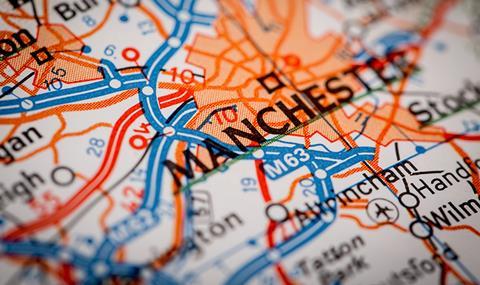
Greater Manchester has revealed proposals to implement a charging clean air zone (CAZ) spanning all 10 local authorities in the region by 2021.
It will be the largest CAZ outside of London, stretching across 500 square miles.
Operators of non-compliant HGVs, buses/coaches, taxis, minibuses and private hire vehicles will be charged a daily fee to enter when the CAZ starts in 2021.
The proposed fee is £100 per day for HGVs not meeting Euro-6 standard.
From 2023 vans will also come into scope and charged £7.50 if non-compliant. Greater Manchester said this was to enable more time for compliant models to be widely available on the second-hand market for van operators.
Cars have not been included in the CAZ, Greater Manchester has claimed its modelling shows it would not clean up air quality any faster and would negatively impact deprived communities.
The CAZ is part of a wider scheme of air quality measures Greater Manchester wants to action to reduce pollution across the city region.
A report outlining the proposals has been sent to Greater Manchester Combined Authority and will be voted on this Friday (1 March).
It states that “considerable financial support” will be needed for government to support businesses to switch to cleaner vehicles and that a CAZ would not be implemented without such funding.
Read more:
- Birmingham creates new website to help fleet operators with clean air zone compliance
- Older HGVs will pay £50 Leeds Clean Air Zone charge, but £15k upgrade grants up for grabs
- LoCITY Fuels in Action event to take freight operators ‘Beyond ULEZ’
Greater Manchester has asked for funding of £116m to be share between the freight sector, taxis and bus operators to transition to cleaner vehicles.
This includes plans for a £59m Clean Freight Fund for local small businesses in the form of a discount on the purchase of a compliant commercial vehicle when scrapping a non-compliant vehicle or retrofitting to make compliant.
The proposals would also see a significant investment in 600 new public rapid electric vehicle charging points across the city-region – nearly trebling the size of the current electric charging network.
Mayor of Greater Manchester, Andy Burnham, said: “This is not a congestion charge by the front door or back door. Instead, this is a balanced package of measures to clean up our air without punishing businesses or deprived communities.
“But we need government to guarantee the right level funding to help us tackle the scale of the problem without damaging our local economies. That includes adequate financial support so we can help businesses make the change to cleaner vehicles.
“Without this backing we won’t be able to do what’s required to drastically improve our air quality.
If the proposals are approved later this week, they will be submitted to government by the end of March and a final business case would be developed by the end of 2019 following public consultation.













